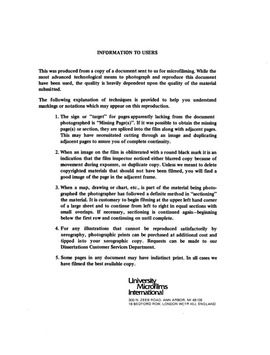| dc.contributor.author | Wongruangwisarn, Pattarawalai, | en_US |
| dc.date.accessioned | 2013-08-16T12:28:19Z | |
| dc.date.available | 2013-08-16T12:28:19Z | |
| dc.date.issued | 1980 | en_US |
| dc.identifier.uri | https://hdl.handle.net/11244/4843 | |
| dc.description.abstract | The data for this study were obtained by administering questionnaires to 345 employees of the 10 organizations. The two forms of questionnaires used in the study contained questions from the Survey of Organizations (University of Michigan) and Mott's effectiveness survey questionnaire. The two questionnaires were translated into the Thai language. The sample of 10 organizations were randomly selected from the total population of 53 large manufacturing organizations which employed 1,000 or more employees and were established in Bangkok. | en_US |
| dc.description.abstract | This study was designed to investigate the managerial style and organizational effectiveness of the large manufacturing organizations in Bangkok. It was to identify the predominant style of managerial leadership; to examine the differences in managerial styles among the different organizational hierarchical levels and among the different departments; to identify the difference between the actual and the ideal style of managerial leadership as perceived by members of the organizations; to examine the relationship between management systems and the organizational effectiveness; and to examine the differences of managerial styles and organizational effectiveness among managers at various educational levels. | en_US |
| dc.description.abstract | After the data were analyzed, the following findings were presented: (1) The predominant managerial style of these organizations was the "Consultative" or System 3; (2) No difference among the managerial styles of the three levels (top manager, department manager, and supervisor) was found; (3) No difference among the managerial styles of the four types of departments (personnel, marketing, accounting and finance, and production); (4) Employees of the organizations desired for a more participative management system (System 4); (5) Management Systems had direct positive relationship with the effectiveness of the organizations; and (6) The education of department manager did not effect on his managerial style and the effectiveness of his department. | en_US |
| dc.format.extent | x, 146 leaves : | en_US |
| dc.subject | Business Administration, General. | en_US |
| dc.title | Managerial leadership style and organizational effectiveness in large manufacturing organizations in Bangkok. | en_US |
| dc.type | Thesis | en_US |
| dc.thesis.degree | Ph.D. | en_US |
| dc.thesis.degreeDiscipline | Jeannine Rainbolt College of Education | en_US |
| dc.note | Source: Dissertation Abstracts International, Volume: 42-01, Section: A, page: 0292. | en_US |
| ou.identifier | (UMI)AAI8113251 | en_US |
| ou.group | Jeannine Rainbolt College of Education | |
